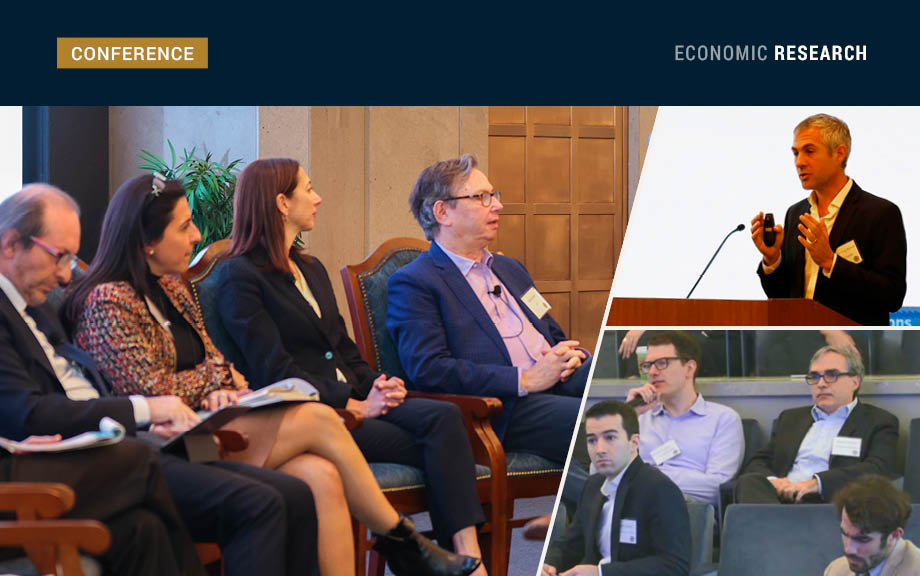Global Supply Chain Pressure Index: The China Factor

In a January 2022 post, we first presented the Global Supply Chain Pressure Index (GSCPI), a parsimonious global measure designed to capture supply chain disruptions using a range of indicators. In this post, we review GSCPI readings through December 2022, and then briefly discuss the drivers of recent moves in the index. While supply chain disruptions have significantly diminished over the course of 2022, the reversion of the index toward a normal historical range has paused over the past three months. Our analysis attributes the recent pause largely to the pandemic in China amid an easing of “Zero COVID” policies.
Highlights from the Fifth Bi‑annual Global Research Forum on International Macroeconomics and Finance

The COVID-19 pandemic, geopolitical tensions, and distinct economic conditions bring challenges to economies worldwide. These key themes provided a backdrop for the fifth bi-annual Global Research Forum on International Macroeconomics and Finance, organized by the European Central Bank (ECB), the Federal Reserve Board, and Federal Reserve Bank of New York in New York in November. The papers and discussions framed important issues related to the global economy and financial markets, and explored the implications of policies that central banks and other official sector bodies take to address geopolitical developments and conditions affecting growth, inflation, and financial stability. A distinguished panel of experts shared diverse perspectives on the drivers of and prospects for inflation from a global perspective. In this post, we discuss highlights of the conference. The event page includes links to videos for each session.
Federal Reserve System Conference on the Financial Stability Considerations for Monetary Policy

How does monetary policy affect financial vulnerabilities and, in turn, how does the state of the financial system interact with the maximum employment and price stability goals of monetary policy? These were the key questions covered in the September 30 conference organized by the Federal Reserve System. The conference was co-led by Federal Reserve Board Vice Chair Lael Brainard and Federal Reserve Bank of New York President and CEO John C. Williams, each of whom offered prepared remarks. The program also included a panel of current and former central bank policymakers to explore the themes of the conference, as well as paper presentations with discussants. In this post, we discuss highlights of the conference. The agenda includes links to all of the presentations as well as videos for each session.
The New York Fed DSGE Model Forecast—March 2022

This post presents an update of the economic forecasts generated by the Federal Reserve Bank of New York’s dynamic stochastic general equilibrium (DSGE) model. We describe very briefly our forecast and its change since December 2021. As usual, we wish to remind our readers that the DSGE model forecast is not an official New York Fed forecast, but only an input to the Research staff’s overall forecasting process. For more information about the model and variables discussed here, see our DSGE model Q & A.
The Global Supply Side of Inflationary Pressures

U.S. inflation has surged as the economy recovers from the COVID-19 recession. This phenomenon has not been confined to the U.S. economy, as similar inflationary pressures have emerged in other advanced economies albeit not with the same intensity. In this post, we draw from the current international experiences to provide an assessment of the drivers of U.S. inflation. In particular, we exploit the link among different measures of inflation at the country level and a number of global supply side variables to uncover which common cross-country forces have been driving observed inflation. Our main finding is that global supply factors are very strongly associated with recent producer price index (PPI) inflation across countries, as well as with consumer price index (CPI) goods inflation, both historically and during the recent bout of inflation acceleration.
How Does U.S. Monetary Policy Affect Emerging Market Economies?

The question of how U.S. monetary policy affects foreign economies has received renewed interest in recent years. The bulk of the empirical evidence points to sizable effects, especially on emerging market economies (EMEs). A key theme in the literature is that these spillovers operate largely through financial channels—that is, the effects of a U.S. policy tightening manifest themselves abroad via declines in international risky asset prices, tighter financial conditions, and capital outflows. This so-called Global Financial Cycle has been shown to affect EMEs more forcefully than advanced economies. It is because higher U.S. policy rates have a disproportionately larger impact on rates in EMEs. In our recent research, we develop a model with cross-border financial linkages that provides theoretical foundations for these empirical findings. In this Liberty Street Economics post, we use the model to illustrate the spillovers from a tightening of U.S. monetary policy on credit spreads and on the uncovered interest rate parity (UIP) premium in EMEs with dollar-denominated debt.
The New York Fed DSGE Model Forecast—March 2020
This post presents an update of the economic forecasts generated by the Federal Reserve Bank of New York’s dynamic stochastic general equilibrium (DSGE) model. We describe very briefly our forecast and its change since December 2019. As usual, we wish to remind our readers that the DSGE model forecast is not an official New York Fed forecast, but only an input to the Research staff’s overall forecasting process. For more information about the model and variables discussed here, see our DSGE model Q & A.
Modeling the Global Effects of the COVID‑19 Sudden Stop in Capital Flows

The COVID-19 outbreak has triggered unusually fast outflows of dollar funding from emerging market economies (EMEs). These outflows are known as “sudden stop” episodes, and they are typically followed by economic contractions. In this post, we assess the macroeconomic effects of the COVID-induced sudden stop of capital flows to EMEs, using our open-economy DSGE model. Unlike existing frameworks, such as the Federal Reserve Board’s SIGMA model, our model features both domestic and international financial constraints, making it well-suited to capture the effects of an outflow of dollar funding. The model predicts output losses in EMEs due in part to the adverse effect of local currency depreciation on private-sector balance sheets with dollar debts. The financial stresses in EMEs, in turn, spill back to the U.S. economy, through both trade and financial channels. The model-predicted output losses are persistent (consistent with previous sudden stop episodes), with financial effects being a significant drag on the recovery. We stress that we are only tracing out the effects of one particular channel (the stop of capital flows and its associated effect on funding costs) and not the totality of COVID-related effects.











 RSS Feed
RSS Feed Follow Liberty Street Economics
Follow Liberty Street Economics